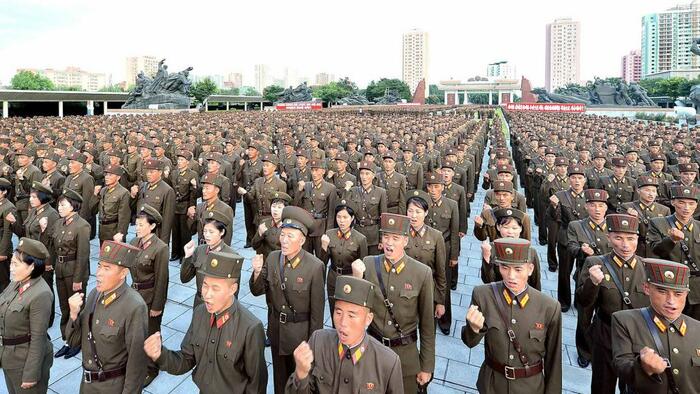In a recent development in the ongoing conflict involving Ukraine, South Korea and the United States have reported that thousands of North Korean troops are now stationed at the front lines, particularly in Russia’s Kursk oblast. This region has seen increased military activity since a cross-border offensive by Ukrainian forces began in August. According to Jeon Ha-kyou, the South Korean defense ministry spokesman, it is estimated that over 10,000 North Korean soldiers have been deployed in Russia, with a significant portion stationed in combat areas. The Pentagon has echoed this assessment, indicating that these troops are expected to provide combat or support capabilities, raising concerns regarding their potential engagement with Ukrainian forces.
The situation escalates as Ukrainian officials claim that they have exchanged fire with North Korean troops for the first time, which reportedly occurred within the Russian territory of Kursk. This marked event is significant, as it represents an escalation in the conflict and the first instance of a foreign army directly participating in the war in Ukraine since the onset of Russia’s full-scale invasion. Ukrainian intelligence officials have reported that military units from North Korea have come under fire, a claim that illustrates the precarious and volatile nature of the current battlefield dynamics. The potential implications of these actions could be vast, drawing in more international scrutiny and potentially leading to direct confrontations.
Ukraine’s Foreign Minister Andrii Sybiha has urged for strong measures in response to North Korean involvement in the conflict, framing the presence of DPRK troops as an aggressive act against a sovereign European nation. This call for decisive action reflects Ukraine’s broader strategy to rally international support against foreign military interventions. The urgency of his message to European leaders highlights the growing complexity of the war, especially with foreign troops now actively engaged in hostilities. Sybiha’s statements underline a pivotal moment in the conflict where international alignments and responses are critical as the situation evolves.
The Pentagon has issued warnings that North Korean troops will become legitimate military targets if they engage in combat against Ukraine. This position underscores the United States’ commitment to supporting Ukrainian sovereignty amidst increased foreign intervention. The potential for these North Korean forces to contribute to combat situations could significantly alter the operational landscape of the war, presenting new challenges for Ukrainian military forces as they navigate the evolving threat matrix.
Despite the escalating claims from Ukraine and its allies, both the Russian and North Korean governments have not explicitly confirmed the deployment of these troops or their role in the conflict. However, hints of a defense agreement between Russian President Vladimir Putin and North Korean leader Kim Jong Un, forged during a recent summit, suggest a cooperative military endeavor. This partnership could facilitate military strategies that align with their mutual interests, possibly complicating the situation for Ukraine and its Western backers.
In response to these developments, Ukrainian President Volodymyr Zelensky has intensified his appeals to the US and NATO, advocating for the removal of restrictions on the use of Western-supplied long-range missiles against Russian targets. The involvement of North Korean troops has heightened the urgency behind Zelensky’s rhetoric, yet the response from Western allies remains hesitant. This reluctance may reflect broader strategic considerations around escalation and the implications of a more direct confrontation with North Korea and Russia in the theater of war. As the conflict evolves with the active participation of foreign military forces, the landscape of international military cooperation and response continues to shift dramatically.

